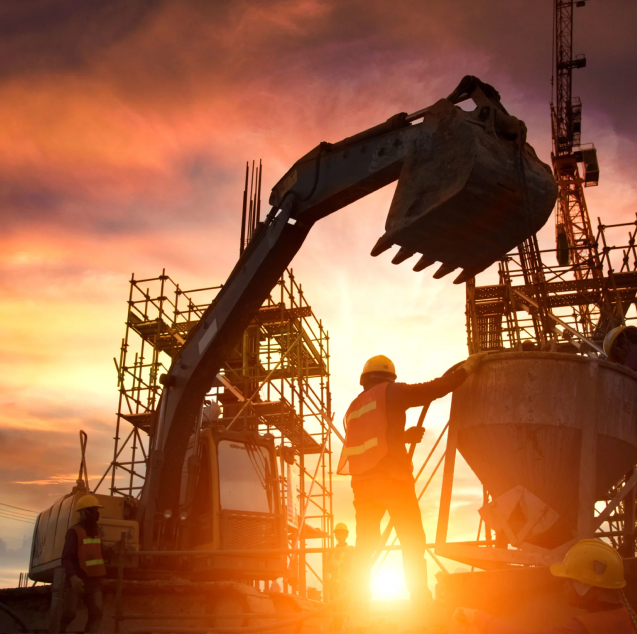Construction
India's construction sector drives economic growth, with robust infrastructure investments, expanding logistics, and a focus on sustainable development.


-
Connect with Sector Expert
Connect



-

$1 Tn
Contribution of the construction sector to Indian economic output by 2030, with employment in the sector increasing by 100 Mn
-

6th
One of the largest recipients of the FDI Inflows with total FDI inflows worth $36.16 Bn during April 2000 and March 2025
-

$8.9 Bn
Revenue generation potential of the warehousing market in the upcoming decade.
Sector Overview
India's construction sector stands as a cornerstone of the nation's economic strategy, pivotal in addressing critical infrastructure needs and providing substantial employment opportunities. Infrastructure construction and real estate assets like offices, retail, housing, and data centres have been the major focus areas for both the government and the private sector. Logistics and warehousing have emerged as critical components within India's construction sector, driven by rapid urbanization and the need for efficient supply chain networks. According to NAREDCO and Knight Frank's Report, India’s warehousing market is expected to see potential demand for 159 Mn square feet by 2047, with an annual compound growth rate of 4%. The e-commerce and manufacturing industries fuel this growth by driving investments in logistics parks, industrial corridors, and modern warehousing facilities across the country. India's real estate sector is also set to expand significantly, with projections indicating it could reach $5.8 Tn by 2047, contributing 15.5% to the total economic output.
India’s Construction Equipment industry has rapidly transformed from a domestic powerhouse into a formidable global competitor, driving infrastructure development worldwide. According to the Indian Construction Equipment Manufacturers' Association (ICEMA), the industry currently boasts a turnover of $9.5 Bn, making India the world’s 3rd-largest CE market. Demonstrating remarkable momentum, the sector achieved an impressive 26% growth in FY24 alone. With sustained expansion and innovation, India is projected to climb to the 2nd-largest global Construction Equipment Market market by 2030, underscoring its growing influence and leadership in the global infrastructure landscape.
India’s construction materials market was valued at $45 billion in 2022 and is expected to grow at a CAGR of 10.6% to reach $82.5 billion by 2028, reflecting the sector’s consistent growth trajectory. The sector is undergoing a significant transformation characterized by rapid premiumization and an increasing focus on sustainability, driven by evolving consumer preferences and environmental regulations. In the fiscal year 2024-25, the government has bolstered its capital expenditure by 11.1% to $133 Bn, equivalent to 3.4% of the GDP. Such investments are poised to catalyze growth within the construction sector, fostering the development of modern infrastructure nationwide.
Furthermore, government initiatives like the Pradhan Mantri Awas Yojana-Urban (PMAY-U) have marked significant progress by sanctioning 1.18 Cr houses, with 86.6 lakh completed and 1.15 Cr grounded for construction as of September 10, 2024. This initiative aims not only to alleviate urban housing shortages but also to enhance living standards across the country.
Sustainable development remains a key focus within India's construction sector, with government entities and private developers increasingly adopting green building practices and energy-efficient technologies. Initiatives like promoting green buildings aim to reduce environmental impact, enhance energy efficiency, and foster sustainable urban development. These practices not only contribute to environmental conservation but also align with global climate goals.
India's construction sector is poised for substantial growth, supported by significant government initiatives, robust investments in logistics and warehousing infrastructure, and a steadfast commitment to sustainable development. The sector's role in enhancing infrastructure, facilitating urbanization, and driving economic growth underscores its critical importance in India's broader economic strategy. The trajectory of India's construction sector reflects its integral role in shaping the country's economic landscape. With ongoing initiatives like PMAY-U, HRIDAY, etc. substantial investment commitments, a focus on sustainability through green building practices, and advancements in logistics and warehousing infrastructure, the sector is not only meeting current infrastructure demands but also setting the stage for long-term economic resilience and sustainable urban development across the nation.
Why Invest in Construction
-
Global market
3rd largest global construction market by 2025.
-
Robust urban transit network
3rd largest metro network globally, catering to 10 Mn daily riders.
-
Growth Opportunities
Enormous growth opportunities in solid waste management, office stock, retail stock, data centers.
-
Urbanization
50% of India will be living in urban areas by 2046, further giving a boost to the Construction market.

Major Investors








Policy Archive
Blogs
-
Construction
Sep 28, 2024
100 days of progress: How PM Modi’s third term is shaping India
By: Jaydeep Saha
-
Construction
Sep 13, 2024
Industrial smart cities to create jobs, attract investors
By: Rishabh Dwivedi
-
Construction
Sep 12, 2024
Smart cities, smart growth
By: Yash Deepaksinh Rawat

